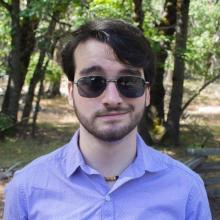I began seeking research opportunities my freshman year and found my first experience the summer after. I held an internship at the US EPA working on computational models of physiologically-based pharmacokinetics and was lucky enough to be part of a wonderful team and have our research published. In the years that followed, I sought more ways to become involved in research. For the summer after my junior year, I was afforded the opportunity to work at the Duke Marine Lab as part of a an NSF REU program. I worked with Dr. Jim Hench modeling wave dynamics on the North Shore of Mo'orea, French Polynesia using the COAWST modeling suite to back-propogate boundary conditions for the regional wave field. I am curently working on my honors thesis research with Dr. Dylan McNamara modeling self-organization of newly observed patterns in coral reef systems. I am creating a pde numerical model to represent the algae Halimeda and coral habitat quality that self-organize into polygonal patterns in nature. I am also going to present my honors thesis research at the National Ocean Sciences Meeting in Portland, Oregon.
When I first came to UNCW, I knew that I wanted to end up doing research. I contacted Dr. McNamara my freshman year as part of my HON 110 class; he informed me that I would have to take certain classes before I could work in his lab. I decided that was exactly what I was going to do. While I continued taking classes, I looked for other research opportunities. I found the EPA internship, and later the NSF REU program through the honors college. I had hoped to gain research skills, particularly computational and data analysis skills as well as the opportunity to work with other researchers and learn from them.
My research experiences have given me so much over the years. I have become well versed in both Python and Matlab programming for modeling and data analysis, both very important for any physical oceanography researcher. Through both the EPA internship and my honors thesis, I have become much more familiar with modeling systems of differential equations, especially coupled systems.I have gained so much from my experiences, I cannot even begin to describe it all. I have definitely become much more confident in my ability to research, and to search out answers where there are none.
My experiences have absolutely made me a more viable candidate for potential jobs or graduate research. My experiences have given me many skills that are needed for any professional researcher. In addition, I have been in contact with manyt researchers that I respect and I am sure could help further. I have been contacted by multiple researchers at different graduate institutions that I applied to gauging my interest in their research. Each one that I have talked to has been very impressed with my experiences so far.





